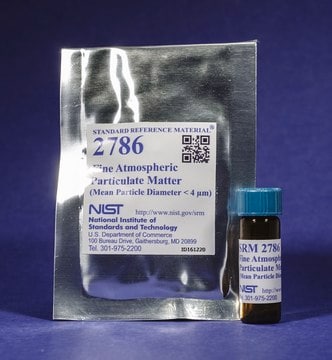ERMCZ120
Fine dust (PM10-like) (trace elements)
ERM®, certified reference material
Faça loginpara ver os preços organizacionais e de contrato
About This Item
Código UNSPSC:
41116107
NACRES:
NA.24
Produtos recomendados
grau
certified reference material
Agency
ERM®
fabricante/nome comercial
JRC
aplicação(ões)
environmental
formato
matrix material
Categorias relacionadas
Aplicação
- Seasonal changes and respiratory deposition flux of PM2.5 and PM10 bound metals in Dhaka, Bangladesh: Investigating the seasonal variability of trace elements in PM10-like particles, this research underscores their respiratory impacts in urban settings. It offers a detailed analysis crucial for biochemical researchers focused on the implications of environmental pollution on public health (Moniruzzaman et al., 2022).
- Mass size distributions, composition and dose estimates of particulate matter in Saharan dust outbreaks: This study evaluates the mass size distributions and composition of PM10 during Saharan dust events, providing essential data for environmental scientists and public health officials. It′s particularly valuable for those studying the transport and deposition of dust-bound trace elements across large geographical areas (Gini et al., 2022).
- Insights into Elemental Composition and Sources of Fine and Coarse Particulate Matter in Dense Traffic Areas in Toronto and Vancouver, Canada: Analyzing the elemental composition of fine and coarse particulate matter, this research aids in understanding the sources and potential health effects of urban air pollution, emphasizing the role of trace elements in environmental and pharmaceutical pollution studies (Celo et al., 2021).
- Seasonal variation and sources of carbonaceous species and elements in PM2.5 and PM10 over the eastern Himalaya: This detailed study on the variability of PM10-like fine dust in the eastern Himalaya offers insights into the sources and impacts of particulate matter, supporting researchers engaged in environmental science and pharmacological studies on inhalable particulates (Sharma et al., 2021).
Nota de análise
For more information please see:
ERMCZ120
ERMCZ120
Informações legais
ERM is a registered trademark of European Commission
Palavra indicadora
Danger
Frases de perigo
Declarações de precaução
Classificações de perigo
STOT RE 1 Inhalation
Código de classe de armazenamento
6.1D - Non-combustible acute toxic Cat.3 / toxic hazardous materials or hazardous materials causing chronic effects
Classe de risco de água (WGK)
WGK 3
Ponto de fulgor (°F)
Not applicable
Ponto de fulgor (°C)
Not applicable
Choose from one of the most recent versions:
Certificados de análise (COA)
Lot/Batch Number
Sorry, we don't have COAs for this product available online at this time.
If you need assistance, please contact Atendimento ao cliente
Já possui este produto?
Encontre a documentação dos produtos que você adquiriu recentemente na biblioteca de documentos.
Os clientes também visualizaram
Jin Kyung Seok et al.
Skin pharmacology and physiology, 31(3), 134-143 (2018-03-23)
Airborne particulate matter with a diameter of < 10 µm (PM10) causes oxidative damage, inflammation, and premature skin aging. In this study, we evaluated whether polyphenolic antioxidants attenuate the inflammatory responses of PM10-exposed keratinocytes. Primary human epidermal keratinocytes were exposed
Jung-Won Shin et al.
International journal of molecular sciences, 21(10) (2020-05-18)
Particulate matter (PM), a major air pollutant, is a complex mixture of solid and liquid particles of various sizes. PM has been demonstrated to cause intracellular inflammation in human keratinocytes, and is associated with various skin disorders, including atopic dermatitis
Nossa equipe de cientistas tem experiência em todas as áreas de pesquisa, incluindo Life Sciences, ciência de materiais, síntese química, cromatografia, química analítica e muitas outras.
Entre em contato com a assistência técnica









